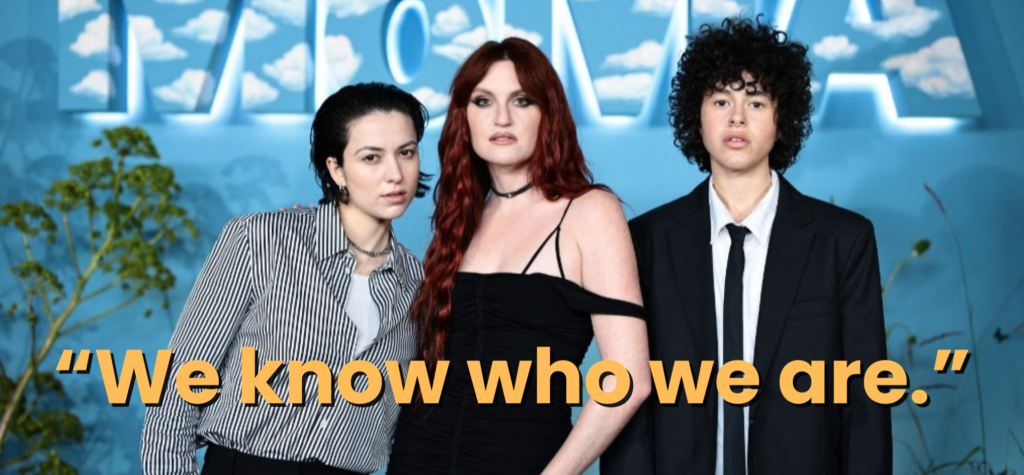Since the pandemic shock of being dropped by its label, the dance-pop band Muna has only seen its star rise, with a hit album, a coveted spot opening for Taylor Swift — and a more defined sense of self.
The Los Angeles-born group beloved for their anthems of queer joy will close out its successful tour — which sold out most dates — later this month at home, at the open-air Greek Theatre.
“It really feels like this is just, like, a culmination of a cycle,” lead singer Katie Gavin told AFP backstage ahead of the band’s highly anticipated performance at this past weekend’s All Things Go festival in Columbia, Maryland.
“We’re quite tired but we are grateful and we’re just happy to be with our team and trying to tap into celebrating everything that we have done in the last little bit because we’ve worked really hard.”
The members of Muna — Gavin, Naomi McPherson, and Josette Maskin — met while studying at the University of Southern California. All of them identify as queer.
They released their debut album “About U” in 2017, scoring an opening slot on Harry Styles’ tour and then releasing the LP “Saves The World” in 2019.
But just after the onset of the coronavirus pandemic, their label RCA cut them loose, citing cost-cutting needs.
In May 2021, they found a new home at Saddest Factory Records, the indie label run by Phoebe Bridgers, who performs both as a solo artist and member of the popular supergroup boygenius.
Shortly thereafter, Muna went viral with the buoyant song “Silk Chiffon,” which features Bridgers.
“Silk Chiffon / That’s how it feels, oh, when she’s on me,” Gavin, 30, sings in the unabashed celebration of queer love.
Muna’s self-titled album, released in June 2022, charted worldwide, and the group turned heads on the festival circuit over the last year, including at Coachella.
For the 30-year-old McPherson, who identifies as non-binary, the group’s success has mirrored a period of maturing into their own identities.
“We’re just, like, grown-ups now,” said McPherson, who uses they/them pronouns.
“When you grow up and you’re a gay kid, you lose a part of your childhood to a performance of a self that’s not true,” they said.
“You begin the process of taking that back, if you’re lucky” as you enter your 20s, they said, “and so you spend the next 10 years of your life doing what you maybe would have done” as an adolescent.
Gavin agreed, adding that earlier in the group’s career, systemic homophobia was a struggle, citing examples including pressure over styling choices in an industry in which “aesthetics really matter.”
“We know who we are more now,” said Maskin, 29.
Paradigm shift
The band members said when it comes to queer representation, the music industry these days is “a different paradigm” than even five years ago.
But, as Gavin put it, that progress is a double-edged sword.
“I think it’s so important for people to know that you can be openly queer and still have a fan base,” Gavin said, “but there’s also a skeptical view that a vast part of the engine of real change has been that people have realized that different identities can be marketable.”
“I do think there is a perception more broadly that queerness is an inroad to success in the entertainment industry now,” added McPherson, “because there’s been so much success and so many trailblazing queer artists who are out.”
“But it’s not,” they continued, chuckling. “I think we feel still marginalized, ultimately.”
For Gavin, the band has found power by ensuring that “the people that are working for us see us as the full human beings that we are.”
“In our physical environment when we’re working, I think we feel seen and heard and understood. And I think that makes all the difference.”
That hard-won confidence has translated to resounding success onstage: Muna delivered a tight, high-octane set at Maryland’s Merriweather Post Pavilion, exuding a cohesive energy that embodies the way they finish each other’s sentences.
Ahead of their electric performance of “Kind of Girl,” Gavin dedicated the track to “the trans cuties here tonight,” saying that even for fans who don’t identify as women, “it’s about using the language that you want to describe your own story.”
And before launching into “I Know a Place,” Gavin told the screaming crowd that the members penned it as “three queers in a college dorm room.”
“We were full of a kind of hope that we could find a space where we could feel totally safe to just express ourselves.”
Judging by the thousands of fans who show up for their performances, Muna has found exactly that.
